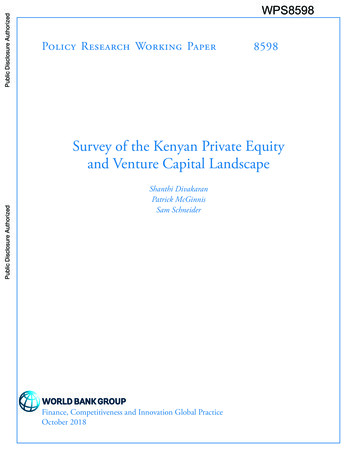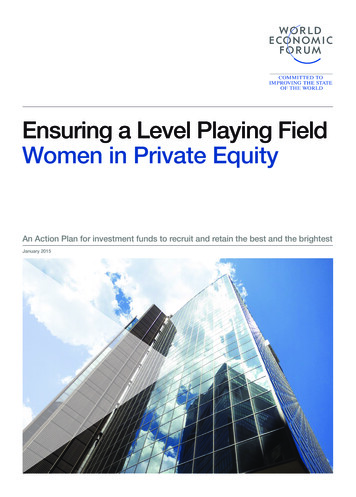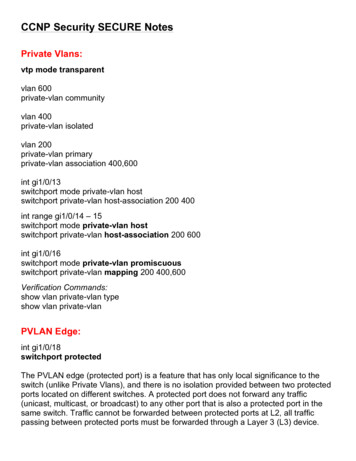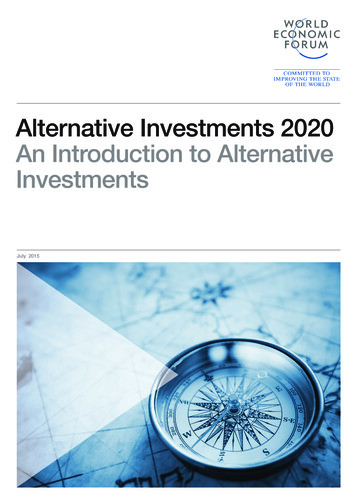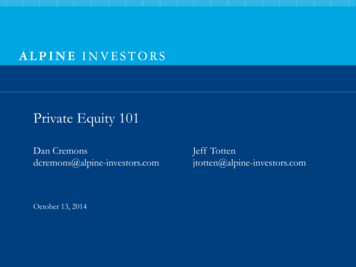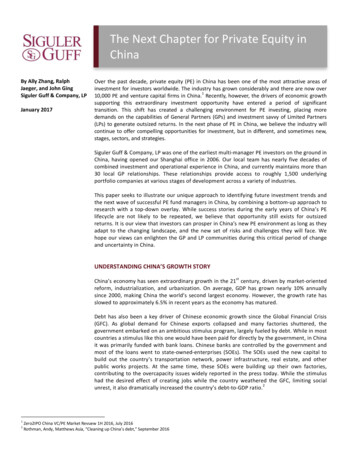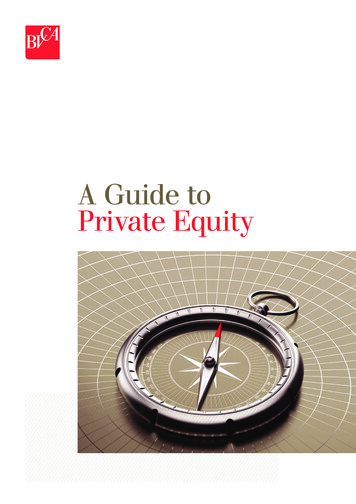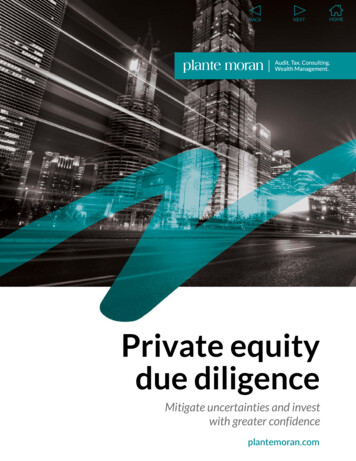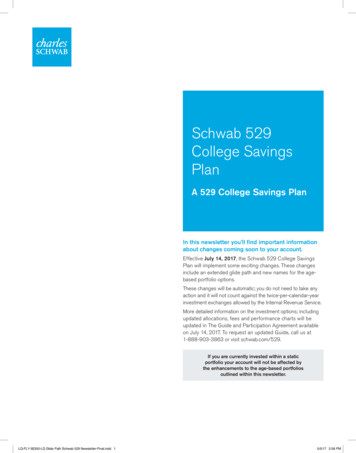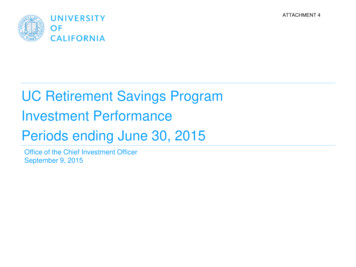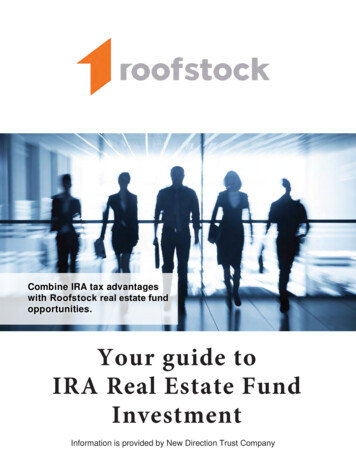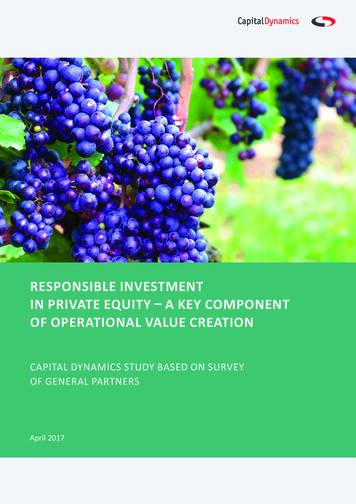
Transcription
RESPONSIBLE INVESTMENTIN PRIVATE EQUITY – A KEY COMPONENTOF OPERATIONAL VALUE CREATIONCAPITAL DYNAMICS STUDY BASED ON SURVEYOF GENERAL PARTNERSApril 2017
2Responsible Investment in Private Equity – a key component of operational value creationCONTENTSUMMARY OF KEY INSIGHTS3ABOUT THE STUDY4RESPONSIBLE INVESTMENTIN PRIVATE EQUITY5RESPONSIBLE INVESTMENT – A KEYCOMPONENT OF OPERATIONALVALUE CREATION6-11ESG FACTORS THAT MATTER12-13CASE STUDY – RI/ESG AT WORK14-15STRONG COMMITMENTBY GENERAL PARTNERS16-17DEGREE OF RI/ESG IMPLEMENTATIONVARIES SIGNIFICANTLY18-22RI/ESG IMPLEMENTATION IS SETTO IMPROVE23CONCLUSION24
Responsible Investment in Private Equity – a key component of operational value creation3SUMMARY OF KEY INSIGHTSSAID HIGHER RETURNSWAS ONE OF THE TOPDRIVERS OF IMPLEMENTINGAN RI/ESG POLICY28%36%MEASURED ANDEXPERIENCED A POSITIVEIMPACT ON EBITDA DUE TOESG ACTIONSTHE MAJORITY OFPRIVATE EQUITYMANAGERSFORMALIZEDRI/ESG POLICIES INRESPONSE TOINCREASING INVESTORREQUIREMENTS.COMMITMENT TORI/ESG IS ALSOEQUALLY DRIVENBY THE IMPORTANCE OFRI/ESG TO INVESTMENTRISK MANAGEMENTTHE MAJORITY OFPRIVATE EQUITYMANAGERS PLAN TOENHANCE THEIRIMPLEMENTATION OFRI/ESG IN THE AREASOF VALUE CREATION,DATA COLLECTIONFROM PORTFOLIOCOMPANIES ANDREPORTING TOINVESTORSOFTEN OR OCCASIONALLYREDUCED AN AQUISITIONBID PRICE BASED ON ESGANALYSIS54%76%SAID THAT THEY WILLINCREASINGLY USE ESGFOR VALUE CREATIONSOCIAL FACTORS AREMORE OFTENCONSIDERED AS ANOPPORTUNTITY FORVALUE CREATION,WHILE GOVERNANCEFACTORS ARE MAINLYVIEWED AS A SOURCEOF RISKINCORPORATINGRESPONSIBLEINVESTMENTPRACTICES ANDCREATINGSUSTAINABLE VALUEARE BECOMING MOREVITAL TO THEOPERATIONALVALUE CREATIONMODEL
Responsible Investment in Private Equity – a key component of operational value creation4ABOUT THE STUDYCapital Dynamics surveyed 175 general partners (GPs) from private equity funds to gaugehow principles of responsible investing andenvironmental, social and governance (ESG)factors are implemented in the investmentprocess. We experienced a high response rate(109 of the 175 GPs responded) with a vastmajority of responses completed by professionals holding senior management positions.BREAKDOWN BY STRATEGY1MID-MARKET BUYOUTGROWTHVENTURE CAPITALLARGE BUYOUTSMALL BUYOUTSPECIAL SITUATIONSINFRASTRUCTUREPRIVATE DEBTBREAKDOWN BY HEADCOUNT49%33%EUROPE100 27%25-10045% 2528%29%17%12%9%9%6%BREAKDOWN BY GEOGRAPHY45%The participants of our survey were well-balanced by size of their most recent flagshipfund with the majority managing mid-marketfunds. Similarly, in terms of headcount, mostrespondents were mid-sized managers with25-100 employees. The study accurately represents the general responsible investmentpractices across the global private equityindustry – the majority of respondents (55%)were outside Europe and all strategies of theprivate equity spectrum were represented.37%NORTH AMERICABREAKDOWN BY FUND SIZE18%16%28%20%36%USD5bn USD1-5bnUSD0.5-1bnUSD 0.5bnASIA-PACIFIC & ROW
Responsible Investment in Private Equity – a key component of operational value creation5RESPONSIBLE INVESTMENT IN PRIVATE EQUITYResponsible investment in private equity is defined typically as an approach to investing that aimsto incorporate environmental, social and governance (ESG) factors into investment decisions tobetter manage risk and generate sustainable, long-term returns. It should not be confused withsocially responsible investing (SRI), which is most known in public equity investing and describesa portfolio construction process that attempts to avoid investments in certain stocks or industriesthrough negative screening according to defined ethical guidelines. Furthermore, while there couldbe a certain overlap, responsible investment in private equity is not the same as impact investing.Impact investing is investing in projects, companies, funds or organizations with the goal of generating and measuring mission-related social, environmental or economic change alongside financialreturns. However, it is also reasonable to assume that responsible investing has a social impact.While Investors or limited partners in private equity funds may be signatories or members ofvarious local or global responsible investing initiatives, many private equity managers or general partners of private equity funds are signatories of the Principles of Responsible Investing(PRI) or follow guidelines issued by local associations that are derived from such principles. Inthe United States, GPs may follow the American Investment Council Guideline of ResponsibleInvesting, while GPs in Europe can adopt the Invest Europe ESG Disclosure Framework. GPs inthe UK are required to make public disclosure in relation to the nature of their commitmentto the UK Financial Reporting Council’s Stewardship Code and the UK Modern Slavery Act.PRI signatories adhere to six principles of responsible investing2. As institutionalinvestors, GPs have a duty to act in the best long-term interests of their beneficiaries. In thisfiduciary role, signatories believe that environmental, social, and corporate governance issuescan affect the performance of investment portfolios. Some underlying portfolio companiesof private equity funds, as well as GPs, are signatories of the United Nations Global Compact. It is both apolicy platform and practical framework for companies that are committed to sustainability and responsible business practices. It also seeks to align business operations and strategies with ten universallyaccepted principles in the areas of human rights, labor, environment and anticorruption and catalyzesactions in support of broader UN goals3. In 2015, The UN Global Compact developed 17 sustainable development goals (SDGs) that private equity firms and underlying portfolio companies may strive to align with.As controlling and active owners of portfolio companies, private equity managers are in the bestposition to manage ESG issues and drive the implementation of principles of responsible investingto help create sustainable growth and increased returns. Aligning the interest of owners and managers as well as bringing additional strategic, financial and operational expertise are at the heart ofthe private equity business model. Our survey provides insights into GPs’ responsible investmentpractices and the current state of implementation of ESG factors throughout the investment cycle.
6Responsible Investment in Private Equity – a key component of operational value creationRESPONSIBLE INVESTMENT – A KEY COMPONENTOF OPERATIONAL VALUE CREATIONAlthough the majority of private equity firmsstarted formalizing RI/ESG policies only afterthe global financial crisis, the evaluation ofcertain ESG risks was long part of the investment process before that. Unsurprisingly,risk management was cited as one of themajor driving forces behind the GPs’ efforts toimplement ESG factors in the investmentprocess. Best-in-class GPs conduct duediligence with the view to identify enviromental, social and governance risks in potentialinvestment opportunities.As part of their due diligence process, suchfirms identify any existing and potential risksstemming from environmental impacts of thebusiness, health and safety issues as well ascompliance with various policies and laws,such as anticorruption policies and laborlaws to name a few. For some investments,managers may engage an external expert toanalyze any legal and environmental risks ortheir supply chain.In recent years, private equity managers haveshifted their focus to better understand howto utilize ESG processes to generate value,post-investment. GPs recognized that anactive ESG approach may result in higherreturns - 28% of our survey respondentssaid that a potential for high returns wasone of the top three drivers for the adoptionof an RI/ESG policy. While this recognitioncan be found across all strategies and GPsaround the world, the majority of firms citingthis driver were from Europe and pursuedthe mid-market buyout strategy. Although thepotential for higher returns was not the maindriver for the majority of respondents, with theincreasing experience in implementing RI/ESGin the investment process, more and more GPsare seeing the benefit of RI/ESG in adding value.
Responsible Investment in Private Equity – a key component of operational value creationIn Capital Dynamics’ experience, privateequity firms can draw up ESG measures andinitiatives that address the companies’compliance with ESG principles, improve governance and decision-making, engage withthe workforce for better health and talentretention as well as improve customer satisfaction and brand in order to gain market share.7All of these actions can directly or indirectlyhave a positive impact on the top lineand bottom line of a portfolio company,reduce operational risk and improve assetquality; leading to an increased companyvaluation. The understanding of thepotential value creation aspect appearsto be manifesting – 78% of respondentsdisagreed with the statement that RI/ESGonly serves as a risk management tool,but does not add value. Moreover, 79% ofrespondents agree that RI/ESG implementation can increase returns to investors.GENERAL PARTNERS' VIEW ON THE IMPACTRI/ESG CAN HAVE ON VALUE YDISAGREE2% 13%9% 66%11% 17%54% 4%24% 0%NO VALUE ADD BUT REDUCES RISKSESG CAN INCREASE RETURNS
8Responsible Investment in Private Equity – a key component of operational value creationThe value-add stemming from an RI/ESGimplementation starts from the acquisitionof a company, as it can enable GPs to identifyrisks, deficient standards and value creationopportunities. It helps negotiate betterprices and terms due to the full awarenessof risks and opportunities: 54% of our surveyrespondents have reduced a bid price basedon findings within their ESG analysis and 32%of respondents paid a higher price based onthe ESG analysis. The ESG analysis and recordsof the portfolio company can also have animpact on material deal financing terms, with20% of respondents experiencing an impact.EXIT VALUATION WAS IMPACTEDBY THE RI/ESG PERFORMANCEOF THE COMPANYYes29%OUTCOME OF RI/ESG ANALYSISON DEAL TERMS54%32%20%17%R P P N Implementation of RI/ESG policies during an exit process can alsohave a positive impact on exit valuation. Improvements in theESG rating of the company during ownership can make the targetmore attractive for potential bidders and increase the number ofsuitors willing to commit to a deal. Furthermore, a company thatis fully prepared to exit in terms of their ESG implementationand documentation can enjoy a smooth exit process, leading toan improved valuation and resulting in a higher value creationfrom the multiple expansion. However, RI/ESG implementationat exit is the least developed area according to respondents.Less than half of respondents said RI/ESG was integrated in theirexit process. Surprisingly, only a quarter of GPs reported thatbuyers conducted frequent RI/ESG due diligence. The majorityof GPs witnessed only an occasional acquisition diligence frombuyers. Nevertheless, 29% of respondents noted that RI/ESGperformance of the company had an impact on exit valuation,either positive or negative.
Responsible Investment in Private Equity – a key component of operational value creation9IMPACT OF RI/ESG ON REVENUE,EBITDA, AND RISK13%M Measuring the impact on revenue can be achallenging endeavor – 80% of respondentshave not yet established such metrics.However, those who do measure the impactappear to achieve growth in revenue (15%),with 2% experiencing a substantial growth inrevenue.More GPs quantify savings or costs resultingfrom ESG initiatives: 38% of respondentsmeasured the ESG impact on EBITDA andalmost all observed a positive impact – twothirds of those respondents experienced asubstantial increase in EBITDA due to ESGactions. Importantly, no GP experienced adecline in EBITDA despite the cost that isincurred during the implementation of ESGactions. If anything, ESG appears to pay for itself.Impact measurement is more developed inthe area of operational risks than in revenueand EBITDA analyses. The majority (55%) ofrespondents measure the impact of RI/ ESGon operational risks, with 22% of respondentsreporting a substantial positive impact and33% a marginal positive impact.2%S 5%N REVENUE80%N 2%N 25%M EBITDA11%S 62%N 33%M RISK22%S 45%N
10Responsible Investment in Private Equity – a key component of operational value creationThe opinion is split as to continued investment in top-quartile managers, irrespectiveof their commitment to RI/ESG principles:47% of respondents believe that investors willcontinueinvestingwithtop-quartilemanagers, 38% of respondents expect thatinvestors cease investments if top-quartilemanagers are not committed to RI/ESG and15% have no opinion on this. Nevertheless,all of the responding private equity managersbelieve that responsible investments and ESGprinciples are here to stay and will onlyincrease in importance over the years to come.Since the beginning of the private equityindustry, the road to success has continuouslyevolved. After the global financial crisis,the private equity model has relied heavilyon operational value creation rather thanfinancial leverage, also seeking new sourcesto increase returns in order to support futuresuccess. Incorporating RI/ESG practices andcreating sustainable value is becoming vitalto the operational value creation model. Thevalue creation potential derived from ESGinitiatives is strongly recognized by GPs. Threequarters of our respondents said that theywill increasingly use RI/ESG for value creation.Many GPs are still in the early stages of theirRI/ESG programs and view the integration ofsuch programs in the value creation processas one of their top priorities. The results of oursurvey suggest RI/ESG does not solely play arole in preserving value, but experienced GPshave already started to see additional benefits, resulting in increased returns to investors.95%AGREE THAT RI/ESG WILLINCREASE IN IMPORTANCE76%AGREE THAT THEY WILLINCREASINGLY USE RI/ESGFOR VALUE CREATION
Responsible Investment in Private Equity – a key component of operational value creationCAPITAL DYNAMICS PERSPECTIVEAs conveyed by our survey, a continued increase in the importance of RI/ESG for GPs is expected.Further, we anticipate improvements in the way GPs communicate their RI/ESG efforts to investorsand the public. For investors, it will be crucial to lift the curtain and look behind these marketingefforts. Capital Dynamics believes and observes that implementing responsible investment policies leads to robust long-term returns for investors. Most importantly, we are convinced that RIprinciples need to be deeply embedded into an organization’s culture and values in order to beeffective.This study underpins our responsible investment approach in private equity and demonstratesthat GPs who took action on RI/ESG, instead of merely talking about it, were able to measurablyimprove operational performance and reduce business risks for their investments. We envisagethat RI/ESG will become a vital building block for the operational value creation model in privateequity and, as our study shows, this trend is manifesting. Therefore, analyzing the implementationof RI/ESG principles and measuring their impact on value commands a pivotal role in due diligence.11
Responsible Investment in Private Equity – a key component of operational value creation12ESG FACTORS THAT MATTERWe asked GPs which ESG factors they considerand why. Among 43 environmental, social andgovernance factors as recommended by thePRI, GPs were asked to indicate which wereconsidered as a source of risk, opportunity forvalue creation, considered on ethical groundsor not considered at all.ESG FACTORS4 –FOR VALUE CREATION5TOP 10Employee engagEnergyefficiencyementtiontracee atagementWaste manntioneteand rgueialoolder dStakehtioncafsitasmentustomeroyEmplCSupply chaagein manmentnageamlitaHealtn capBh & saoardHumafetycompositionInterestingly, social factors were viewed primarily as an opportunity for value creation.Customer satisfaction, employee attractionand retention as well as supply chain management were the three most relevant factorsconsidered from a value creation perspective.Governance factors were predominantlyconsidered as a source of risk. Bribery and corruption, conflict of interests as well as compliance were the most frequently cited factors.ESG FACTORS4 –SOURCES OF RISK5TOP 10AccoCompunting staliancendardsstseretf in ptionuflict oHazardous maLabor standardsterialsorilrity ncdnry a and liab er pollutioConBriPbroeduct safety Air and watHealth & safetyData protection and privacy
Responsible Investment in Private Equity – a key component of operational value creation13Health & safety was very important for GPs from both the risk management and value creation perspectives: it was the only factor out of the top ten to be considered both a source of risk and anopportunity for value creation.ESG FACTORS4 –ETHICAL GROUNDS5TOP 10ioromvbehaevitpetirdsption unity relationsurromnd cd comndaor staAnti-cLabry a overnment an lianceebirGBCompDiversity a Human rightsBusin nd equal oIndigenous rightspporteuConfl ss ethnitiesict oficsinterestsSome social factors such as human rights,diversity and equal opportunities as wellas governance factors such as bribery andcorruption were taken into considerationon ethical grounds.While environmental factors such asenergy efficiency and waste managementwere selected frequently as opportunitiesfor value creation, environmental factorssuch as biodiversity, land degradationand deforestation were among the leastconsidered factors.
14Responsible Investment in Private Equity – a key component of operational value creationCASE STUDY6 – RI/ESG AT WORKAPPROACH TO RI/ESGLyceum Capital has adopted RI/ESG policies since inception in 1999. In the intervening years, theirapproach has become more sophisticated – they have evolved from having an investment strategythat excludes sectors to recognizing RI/ESG as a core portfolio company development area. Their RI/ESG policy is implemented throughout their operations and development processes, including theironline Best Practice Centre portal. Core to Lyceum is realizing the value in identifying and managingESG-related opportunities and risks, as well as reporting on them. Lyceum recognizes that ESG isat the heart of building sustainable, market-leading businesses that attract premium valuations particularly from strategic buyers. All Lyceum companies face different ESG development needs- occasionally environmental, often social and governance. Lyceum’s operational review pre- andimmediately post-completion identifies key areas for development. This includes inducting portfoliocompanies into Lyceum’s ESG framework and reporting cycle. Working with Lyceum’s ESG SpecialistPartner, management teams identify ESG risks and opportunities as well as create a reportingtemplate that allows them to effectively monitor progress and report efficiently to the companyboard and Lyceum. Lyceum tracks progress across the portfolio, sharing best practices with portfoliocompany management teams at their regular CEO or CFO conferences and maintain a record ofperformance to share with investors. The following case study of Adapt demonstrates how the ESGactions of Lyceum Capital helped generate higher returns for investors.Provides IT infrastructure as a service to UK and internationalcustomers. Operating under multi-year contracts, the companyprovides business-critical IT infrastructure to customers for whomIT resilience is a core element of driving revenue.INVESTMENT VISIONAND STRATEGYTHE ROLE OF ESGIN VALUE CREATIONRESULTWith exceptional sales andmarketing capabilities atacquisition but only a nascentmanaged cloud services(‘MCS’) offering, the strategyfor Adapt was to transform itinto a leading MCS provider,delivering high margin andquality infrastructure servicesto customers from its ownnetwork infrastructure.ESG engagement supportedthe approach taken to a number of higher risk matters thatcould have resulted in adverseperformance. This proactiveapproach enabled the business, in fact, to convert thoserisks to gains.Managed Cloud Services grewfrom GBP 3 million in revenueand 56% gross profit marginin 2011 to GBP 29 million inrevenue and 76% gross profitmargin in 2016. This organicgrowth enabled LyceumCapital to increase the valueof the company by more thanthree times during ownership.Lyceum Capital sold Adapt in2016 to Datapipe, a US managed cloud services provider.MEASUREDESG VALUE ADDEDRevenuegrowth 20%Margingrowth 35%
Responsible Investment in Private Equity – a key component of operational value creation15SELECT ESG ACTIONS AND OUTCOMESESG CHALLENGEACTIONS & OUTCOMESMinimizing power consumption As well as ensuring maximum efficiency of its hardof serversware’s power consumption, Adapt’s policy enabled it Power consumption of servto deliver high-resilience performance for customersers varies widely accordingfrom data centers that had low power ratings.to manufacturers’ specifica- Recognizing the significant power use of data centers,tions and quality.Adapt had a clearly stated policy of using only the mostenergy efficient hardware. This allowed the group to deliver to customers’ capacityneeds where other competitors could not, supportingthe growth in contracted revenue.Retaining, integrating and motivating employees from acquiredcompanies The company’s plan includedtargeted M&A to build functionality and accelerate thetransition to MCS includingadd-ons in Cardiff and Leeds. Integrating newly ‘acquired’staff was key to deliveringstrong continued servicelevels for customers anddriving the organic growthopportunity from contending the productivity of thosestaff members. Investing in staff to ensure alltraining needs are kept up todate. Senior management devoted significant time to operations in Cardiff. This leadership engagement formeda critical part of Cardiff’s operations – resulting insignificant capacity and productivity gains as the groupdelivered on its growth plans, supporting the 35%growth in MCS margins. The increased technical skill base supported the company’s ability to deliver the extended service range andquality provided to customers, which underpinned theachieved growth. Sickness rate was carefully tracked as an early indicatorof churn risk, with systematic reporting to the boardbeing introduced. The technical capabilities that both operations broughtto the group were key to increasing service quality,supporting sales performance and driving significantproductivity gains, which underpinned the improvedmargins.Ensure change of operations The transfer of all technical operations and backand back office locations doesoffice activities from the City of London to Cardiffnot result in a fall in quality ofwas achieved. While some service levels sufferedserviceduring the switch, the end result was a coherent and The long-term needs ofwell-functioning team that delivered excellent servicethe business required thisto customers and enabled the MCS division to growchange to happen. The raterevenues at 20%.of growth would be severelyimpacted if service levelswere to drop off as part ofthe transfer of operations.
16Responsible Investment in Private Equity – a key component of operational value creationSTRONG ESG COMMITMENT BY GENERAL PARTNERSHAVE RI/ESGPOLICIES78%The formalization of the commitment to RI and the consideration of ESGfactors is becoming prevalent among the private equity industry. 78%of survey respondents have already established RI/ESG policies, while9% plan to establish them in the future. Only a few firms did not havesuch policies in place - typically venture firms - and hold the belief thatESG factors are not material to their investments. The remainder of theparticipants decided against explicit formalization, as RI/ESG principles arealready embedded in their investment processes and culture.
Responsible Investment in Private Equity – a key component of operational value creation17TOP 3 DRIVERS FOR RISK IAL OFHIGHER RETURNS77%12%RISK MANAGEMENTRISK MANAGEMENT28%Investor requirements and riskmanagement were the main andequally important drivers for GPscommitting to RI/ESG. Many LPs,who have adopted RI/ESG principles,expect their private equity managersto have formal policies and processesin place, which has prompted GPs toshow commitment by establishingsuch policies.66%The motivation is more nuancedwhen results were broken down byENHANCEMENT OFGP REPUTATIONthe type of the firm. While investorrequirements were the main driverfor venture and growth capital firms,risk management was firmly on the agenda for those pursuing buyout, infrastructure and privatedebt strategies.32%ETHICALCONSIDERATIONSA geographical breakdown also revealed a slight difference among managers across differentregions. Investors’ requirements were the primary reason for GPs from North America andAsia-Pacific to commit to RI/ESG, while risk management was the top reason for European GPs.Additionally, ethical considerations had more weight for GPs in Europe and Asia-Pacific than forNorth American GPs.FORMAL COMMITMENTS TO LPs7Investor initiatives result in GPs makingcontractual obligations with respect to RI/ESG, primarily in the form of side letters,PPM34% while one-third use private placementmemoranda (PPMs). Our investment teamLPA20% has seen firms that supplement PPMswith ESG due diligence questionnaires toNONE21% address the most common questions fromprospective investors. The incorporationof ESG clauses in the limited partnershipagreements (LPAs) is the least used means of commitment. At the other end of the spectrum, 21%of firms do not formalize their commitments beyond establishing a policy.SIDE LETTERS68%
18Responsible Investment in Private Equity – a key component of operational value creationDEGREE OF RI/ESG IMPLEMENTATION VARIESSIGNIFICANTLYExpressing the initial commitment to RI/ESG is the first step that many firms havetaken in the private equity industry. It is then important to select a suitable resource tocarry out ESG efforts, establish accountability and cultivate an investment culture that embodiesRI/ESG principles throughout daily work in order to implement policies andprocesses. Our survey reveals that RI/ESG is embraced by deal teams and led by dedicated ESGprofessionals across many firms. Moreover, the overwhelming majority of respondents invest incontinuous RI/ESG training for their employees - in fact, 73% of our respondents do so regularly.
Responsible Investment in Private Equity – a key component of operational value creationA third of respondents have dedicated professionals spearheading ESG efforts across their organization. As expected, larger firms with headcounts of 100 were more likely to have such dedicated resources. Accountability was sharedacross deal teams by two-thirds of all firms.19In addition, many firms engage expert consultants while conducting due diligence inorder to assess specific legal, social or environmental risks in certain sectors. A significantportion of respondents continue to monitorESG compliance and progress during holding, therefore accountability is also sharedwith deal monitoring teams. By and large,deal-related resources have been dedicated toaddressing ESG issues for 88% of respondents.Only 4% of respondents said that responsibility resides within their investor relationsteam, while 8% assign such tasks solely tocompliance functions. This indicates thatadequate resourcing and accountability concerning RI/ESG matters are widely recognized.ACCOUNTABILITY FOR RI/ESGIMPLEMENTATION7D / 32%D 68%Por oliomonitoring team49%C 37%A CFO/COO S CFO/COO50%8%A IR 36%S IR4%
20Responsible Investment in Private Equity – a key component of operational value creationWhen it comes to the implementationduring the investment cycle, the progress varies among GPs. At sourcing,about 60% of respondents fully implement RI/ESG policies. However, moreGPs, about three-quarters of respondents, refer to their RI/ESG policiesin order to negatively screen targetcompanies and generally avoid sectorsthat are prohibited by internationalconventions or typically not in favorwith investors (e.g. narcotics, pornography, weapons). Some firms donot maintain a predetermined list ofexcluded industry sectors, but determine the suitability on a case-by-casebasis. 94% of all GPs who participatedin our survey said they implement anESG analysis during their acquisitiondiligence process.INTEGRATION THROUGHOUT INVESTMENT CYCLE794%59%S A 87%R 65% Lorem ipsum47%
Responsible Investment in Private Equity – a key component of operational value creation21The survey results show that ESGrecords of a target company wereoften not detrimental to makinginvestments. This could be linkedto the notion that ESG issues areseen as an opportunity to enhancevalue during ownership of potentialinvestments. However, in cases whererecords indicate substantial risksregarding the future development ofa company, deals have been abandoned; in fact, half of our respondentsclaimed that including an ESG analysiswithin investment papers led to a fewabandoned deals.THE ANALYSIS OF ESG FACTORS OR THE ESG RECORDS OF A TARGETCOMPANY LED TO THE FOLLOWING OUTCOMES:M
IN PRIVATE EQUITY – A KEY COMPONENT OF OPERATIONAL VALUE CREATION April 2017 CAPITAL DYNAMICS STUDY BASED ON SURVEY OF GENERAL PARTNERS. . of private equity funds, as well as GPs, are signatories of the United Nations Global Compact. It is both a . Best-in-class GPs conduct due diligence
